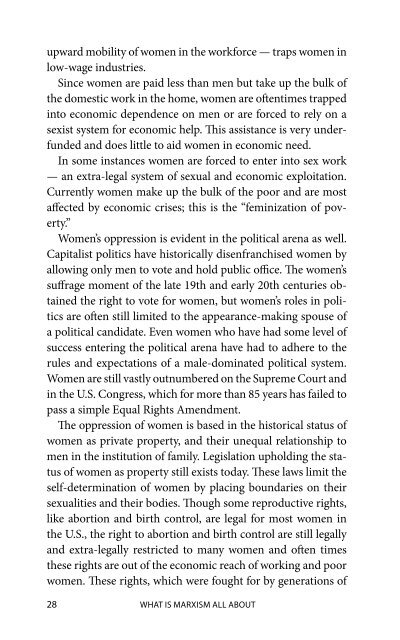what-is-marxism-all-about-by-fist
Create successful ePaper yourself
Turn your PDF publications into a flip-book with our unique Google optimized e-Paper software.
upward mobility of women in the workforce — traps women in<br />
low-wage industries.<br />
Since women are paid less than men but take up the bulk of<br />
the domestic work in the home, women are oftentimes trapped<br />
into economic dependence on men or are forced to rely on a<br />
sex<strong>is</strong>t system for economic help. Th<strong>is</strong> ass<strong>is</strong>tance <strong>is</strong> very underfunded<br />
and does little to aid women in economic need.<br />
In some instances women are forced to enter into sex work<br />
— an extra-legal system of sexual and economic exploitation.<br />
Currently women make up the bulk of the poor and are most<br />
affected <strong>by</strong> economic cr<strong>is</strong>es; th<strong>is</strong> <strong>is</strong> the “feminization of poverty.”<br />
Women’s oppression <strong>is</strong> evident in the political arena as well.<br />
Capital<strong>is</strong>t politics have h<strong>is</strong>toric<strong>all</strong>y d<strong>is</strong>enfranch<strong>is</strong>ed women <strong>by</strong><br />
<strong>all</strong>owing only men to vote and hold public office. The women’s<br />
suffrage moment of the late 19th and early 20th centuries obtained<br />
the right to vote for women, but women’s roles in politics<br />
are often still limited to the appearance-making spouse of<br />
a political candidate. Even women who have had some level of<br />
success entering the political arena have had to adhere to the<br />
rules and expectations of a male-dominated political system.<br />
Women are still vastly outnumbered on the Supreme Court and<br />
in the U.S. Congress, which for more than 85 years has failed to<br />
pass a simple Equal Rights Amendment.<br />
The oppression of women <strong>is</strong> based in the h<strong>is</strong>torical status of<br />
women as private property, and their unequal relationship to<br />
men in the institution of family. Leg<strong>is</strong>lation upholding the status<br />
of women as property still ex<strong>is</strong>ts today. These laws limit the<br />
self-determination of women <strong>by</strong> placing boundaries on their<br />
sexualities and their bodies. Though some reproductive rights,<br />
like abortion and birth control, are legal for most women in<br />
the U.S., the right to abortion and birth control are still leg<strong>all</strong>y<br />
and extra-leg<strong>all</strong>y restricted to many women and often times<br />
these rights are out of the economic reach of working and poor<br />
women. These rights, which were fought for <strong>by</strong> generations of<br />
28 What <strong>is</strong> Marx<strong>is</strong>m All About


